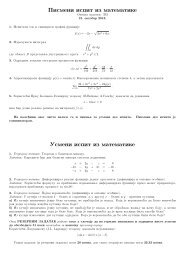WHITE BOOK 2004 EBU Tournament Directors' Guide Edited by ...
WHITE BOOK 2004 EBU Tournament Directors' Guide Edited by ...
WHITE BOOK 2004 EBU Tournament Directors' Guide Edited by ...
You also want an ePaper? Increase the reach of your titles
YUMPU automatically turns print PDFs into web optimized ePapers that Google loves.
White Book – November 2003 – Chapter IV<br />
15.2 Law 15C [Play of wrong board discovered during auction] [WBFLC]<br />
Consider the situation where a pair sits at the wrong table, and an auction starts. They<br />
discover their error, move away, and the correct pair sits down. This Law says that the<br />
pair who remain must make the same calls, and the Director should check to make<br />
sure the new pair make the same calls as the old pair did.<br />
What happens if one of the new pair, having heard the Law, decides he does not really<br />
want to play the board, so opens 7NT which he guesses will be a change from the<br />
earlier auction? This is unacceptable, and is treated as a violation of Law 74A2.<br />
There is no need for the Director to judge the intent of the player: if no satisfactory<br />
bridge reason can be found for the call then he applies Law 74A2. The TD informs (or<br />
instructs) the players correspondingly.<br />
[WBFLC minutes 2001-10-28#6, also 2001-10-30#1]<br />
Law 16<br />
Unauthorised Information<br />
16.1 Unauthorised information not from partner<br />
If a player accidentally gets some information about a board to be played, eg <strong>by</strong><br />
overhearing the result, and (as he should) reports this to the TD, and if the TD allows<br />
the board to played, then no adjusted score can be awarded <strong>by</strong> the TD. This is<br />
because the TD, in allowing the board to played, has decided the information could not<br />
interfere with normal play.<br />
The TD's decision can be appealed.<br />
If the board is in a teams-of-four match and has not been played at the other table then<br />
the TD has no reason to let it be played. He lets it be redealt, or provides a substitute<br />
board.<br />
If one player has knowledge of one hand then the TD may be able to let it be played, if<br />
necessary <strong>by</strong> adjusting positions.<br />
Example A board is thrown across the room in a pairs competition, and the East<br />
player (but no-one else) sees the South hand which falls out of the board.<br />
The TD should let them play the board arrow-switched, so the East player<br />
plays South for that board only, so long as the scorers can cope with this<br />
(see #87.1).<br />
16.2 What does a hesitation mean?<br />
The L&EC considers that:<br />
(a) A hesitation followed <strong>by</strong> a pass would normally be willing to hear partner<br />
bid on<br />
(b) A hesitation followed <strong>by</strong> a minimum bid after RHO’s pass would normally<br />
have something in hand<br />
(c) A hesitation followed <strong>by</strong> a penalty double is normally willing to see it<br />
removed<br />
However, in cases such as 1 pass 3 (slow), the 3 bidder might be considering a<br />
number of actions, ie the pause could have suggested either a 2.5 or a 3.5 bid.<br />
31





